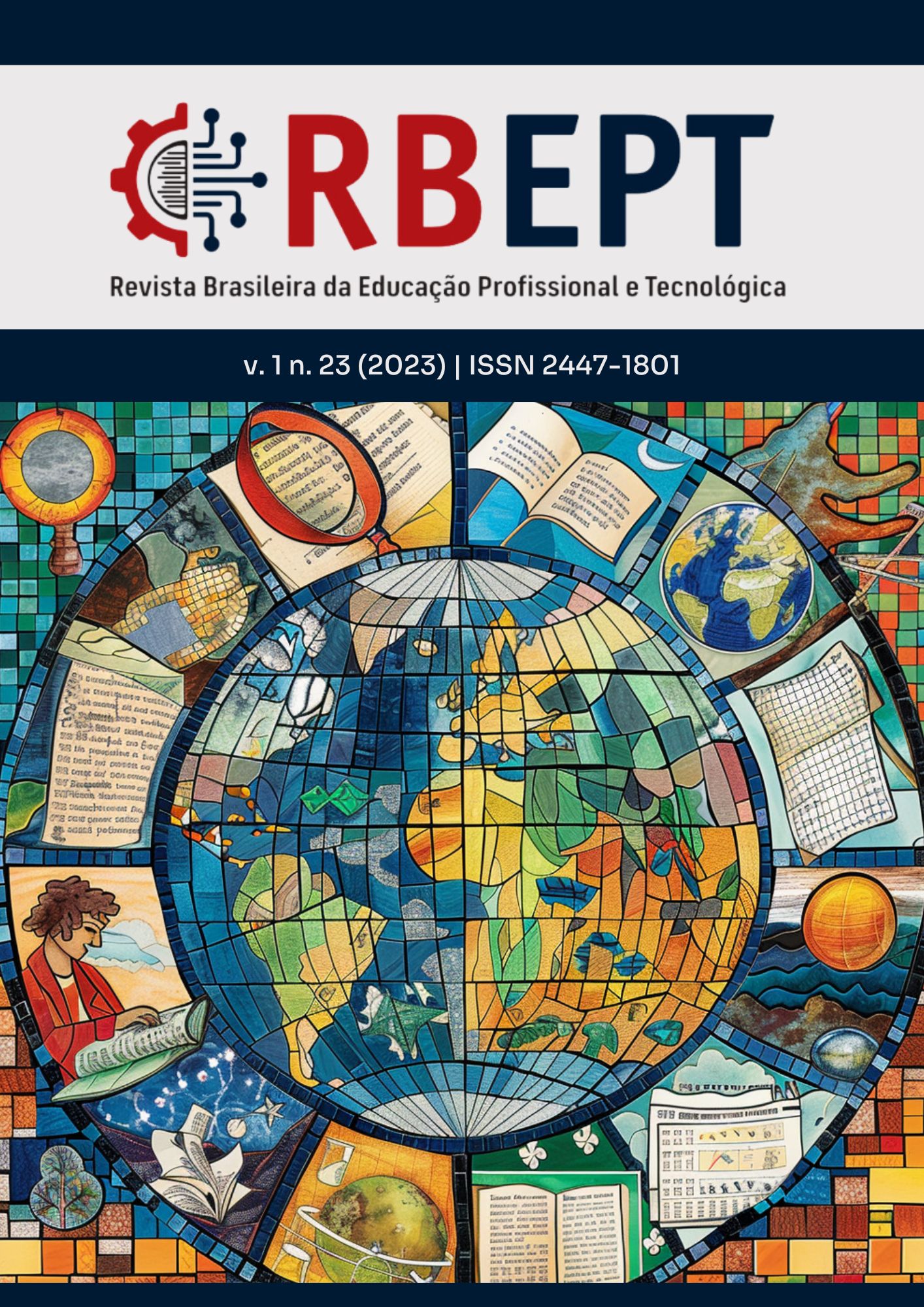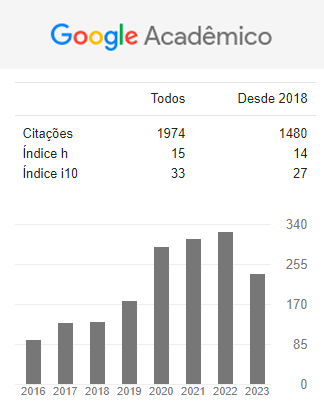Profissional de Tecnologia da Informação, formação acadêmica e empregabilidade
o estado da arte da literatura científica
DOI:
https://doi.org/10.15628/rbept.2023.13407Palavras-chave:
Carreira de TI, Empregabilidade, Habilidade em TI, profissional de TI, Soft SkillsResumo
A empregabilidade dos profissionais no campo de Gestão de Sistemas de Informação (MIS – Management Information System) se tornou um problema que não pode ser ignorado na economia global. Destarte, o objetivo deste estudo é compreender como a literatura cientifica tem abordado os temas “empregabilidade” e “profissional de Tecnologia da Informação”. Um total de 51 estudos foram selecionados como os mais relevantes em quatro décadas de publicações científicas. Os resultados sugerem discussões na reestruturação dos currículos de MIS para atender a demanda do mercado; um reposicionamento no papel do profissional de TI e da própria tecnologia da informação nas organizações e exigências de mercado para esses profissionais, com destaque especial para o desenvolvimento de habilidades Soft Skills.
Downloads
Referências
ALAMELU, R.; LAKSHMINARAYANAN, K. V.; BADRINATH, V. Persistence of employability skills among it software professionals - An analysis. International Journal of Applied Business and Economic Research, [s. l.], v. 15, n. 13, p. 325–333, 2017. Disponível em: <https://www.researchgate.net/publication/321671948_Persistence_of_employability_skills_among_it_software_professionals_-_An_analysis>. Acesso em: 10 maio. 2021.
ALVARADO, R. U. A Lei de Lotka na bibliometria brasileira. Ciência da Informação, [s. l.], v. 31, n. 2, p. 6, 2002. Disponível em: <https://doi.org/10.18225/ci.inf..v31i2.956> DOI: https://doi.org/10.1590/S0100-19652002000200002
ARAÚJO, C. A. Bibliometria: evolução histórica e questões atuais. Em Questão, [s. l.], v. 12, n. 1, p. 11–32, 2006. Disponível em: <https://seer.ufrgs.br/EmQuestao/article/view/16>
BARDIN, L. Análise de Conteúdo. 1. ed. São Paulo/SP: Almedina, 2011.
CAMARGO, B. V.; JUSTO, A. M. IRAMUTEQ: Um software gratuito para análise de dados textuais. Temas em Psicologia, [s. l.], v. 21, n. 2, p. 513–518, 2013. Disponível em: <https://doi.org/10.9788/tp2013.2-16> DOI: https://doi.org/10.9788/TP2013.2-16
CAPPEL, J. J. Entry-level IS job skills: A survey of employers. Journal of Computer Information Systems, [s. l.], v. 42, n. 2, p. 76–82, 2001. Disponível em: <https://www.tandfonline.com/doi/abs/10.1080/08874417.2002.11647490>
CHOONG, L.; HYO, H. Analysis of skills requirement for entry-level programmer/analysts in Fortune 500 corporations. Journal of Information Systems Education, [s. l.], v. 19, n. 1, p. 17–27, 2008. Disponível em: <https://www.researchgate.net/publication/228781976_Analysis_of_Skills_Requirement_for_Entry-Level_ProgrammerAnalysts_in_Fortune_500_Corporations>. Acesso em: 5 maio. 2021.
EITAN, A. T.; SMOLYANSKY, E.; HARPAZ, I. K. Connected Papers. 2021. Disponível em: <https://www.connectedpapers.com/about>. Acesso em: 8 mar. 2021.
FANG, X.; LEE, S.; KOH, S. H. Transition of knowledge/skills requirement for entry-level is professionals: An exploratory study based on recruiters’ perception. Journal of Computer Information Systems, [s. l.], v. 46, n. 1, p. 58–70, 2005. Disponível em: <https://doi.org/10.1080/08874417.2005.11645869>
FITCH, M. By the Numbers: A Growing Demand for IT Skills and Occupations. 2021. Disponível em: <https://blog.techdata.com/authority/business-insight/by-the-numbers-a-growing-demand-for-it-skills-and-occupations>.
FROGERI, R. F.; PORTUGAL JÚNIOR, P. S.; PIURCOSKY, F. P.; SACANATO. V.; CALLE, J. L.; GAZZOLA, S. B.; OLIVEIRA, F. F. Dynamic Ambidexterity: Proposal of a Theoretical and Hypothetical Model. Journal of Contemporary Administration, [s. l.], p. 1–26, 2021. Disponível em: <https://doi.org/10.1590/1982-7849rac2022210088.en> DOI: https://doi.org/10.1590/1982-7849rac2022210088.en
GALLIVAN, M.; TRUEX, D. P.; KVASNY, L. Changing patterns in IT skill sets 1988-2003: a content analysis of classified advertising. The DATA BASE for Advances in Information Systems, [s. l.], v. 35, n. 3, p. 64–87, 2004. Disponível em: <https://doi.org/10.1145/1017114.1017121> DOI: https://doi.org/10.1145/1017114.1017121
GAMA JUNIOR, F. D. C.; FROGERI, R. F.; PIURCOSKY, F. P.; PORTUGAL JÚNIOR, P. S. Modelos de Aceitação de Tecnologia e o Ensino Remoto Durante a Pandemia da Covid-19?: Uma Revisão Sistemática da Literatura. In: 18TH INTERNATIONAL CONFERENCE ON INFORMATION SYSTEMS & TECHNOLOGY MANAGEMENT - CONTECSI 2021, São Paulo, SP. Anais... São Paulo, SP Disponível em: <https://doi.org/10.5748/18CONTECSI/PSE/SPE/6758>
GAROUSI, V.; GIRAY, G.; TUZUN, E.; CATAL, C.; FELDERER, M. Closing the gap between software engineering education and industrial needs. IEEE SOFTWARE. v. 37, n. 2, p. 68-77, 2020. Disponível em: <https://doi.org/10.1109/MS.2018.2880823 >. DOI: https://doi.org/10.1109/MS.2018.2880823
HANNA, S.; JABER. H.; ALMASALMEH, A.; JABER, F. A. Reducing the Gap between Software Engineering Curricula and Software Industry in Jordan. Journal of Software Engineering and Applications, [s. l.], v. 07, n. 07, p. 602–616, 2014. Disponível em: <http://dx.doi.org/10.4236/jsea.2014.77056>. Acesso em: 5 maio. 2021. DOI: https://doi.org/10.4236/jsea.2014.77056
HIRSCH, J. E. An index to quantify an individual’s scientific research output. Proceedings of the National Academy of Sciences of the United States of America, [s. l.], v. 102, n. 46, p. 16569–16572, 2005. Disponível em: <https://doi.org/10.1073/pnas.0507655102> DOI: https://doi.org/10.1073/pnas.0507655102
JONES, K.; LEONARD, L. N. K.; LANG, G. Desired Skills for Entry Level IS Positions: Identification and Assessment. Journal of Computer Information Systems, [s. l.], v. 58, n. 3, p. 214–220, 2018. Disponível em: <https://doi.org/10.1080/08874417.2016.1229144> DOI: https://doi.org/10.1080/08874417.2016.1229144
LEE, D.; TRAUTH, E.; FARWELL, D. W. Critical Skills and Knowledge Requirements of IS Professionals: A Joint Academic/Industry Investigation. MIS Quarterly, [s. l.], 1995. Disponível em: <https://doi.org/10.2307/249598> DOI: https://doi.org/10.2307/249598
LEE, S.; KOH, S. H.; YEN, D.; TANG, H. Perception gaps between IS academics and IS practitioners: an exploratory study. Information & Management, v. 40, n. 1, p. 51–61, 2002. Disponível em: <https://doi.org/10.1016/S0378-7206(01)00132-X> DOI: https://doi.org/10.1016/S0378-7206(01)00132-X
LEITHEISER, R. L. MIS skills for the 1990s: A survey of mis managers’ perceptions. Journal of Management Information Systems, [s. l.], v. 9, n. 1, p. 69–91, 1992. Disponível em: <https://doi.org/10.1080/07421222.1992.11517948> DOI: https://doi.org/10.1080/07421222.1992.11517948
MARCHAND, P.; RATINAUD, P. L’analyse de similitude appliquée aux corpus textuels?: les primaires socialistes pour l’élection présidentielle française. In: ACTES DES 11ÈMES JOURNÉES INTERNATIONALES D’ANALYSE DES DONNÉES TEXTUELLES (JADT) 2012, Anais... [s.l: s.n.] Disponível em: <http://lexicometrica.univ-paris3.fr/jadt/jadt2012/Communications/Marchand, Pascal et al. - L’analyse de similitude appliquee aux corpus textuels.pdf>
MARDIS, M. A.; MA, J.; JONES, F. R.; AMBAVARAPU, C. R.; KELLEHER, H. M.; SPEARS, L. I.; MCCLURE, C. R. Assessing alignment between information technology educational opportunities, professional requirements, and industry demands. Educ Inf Technol, [s. l.], v. 23, p. 1547–1584, 2018. Disponível em: https://doi.org/10.1007/s10639-017-9678-y DOI: https://doi.org/10.1007/s10639-017-9678-y
MCKENZIE, S.; COLDWELL-NEILSON, J.; PALMER, S. Understanding the career development and employability of information technology students. Journal of Applied Research in Higher Education, [s. l.], v. 10, n. 4, p. 456–468, 2018. DOI: https://doi.org/10.1108/JARHE-03-2018-0033
MISRA, R. K.; KHURANA, K. Employability Skills among Information Technology Professionals: A Literature Review. Procedia Computer Science, [s. l.], v. 122, p. 63–70, 2017. Disponível em: https://doi.org/10.1016/j.procs.2017.11.342 DOI: https://doi.org/10.1016/j.procs.2017.11.342
Downloads
Publicado
Como Citar
Edição
Seção
Licença

Este trabalho está licenciado sob uma licença Creative Commons Attribution 4.0 International License.
O autor na submissão do artigo transfere o direito autoral ao periódico. À Revista Brasileira da Educação Profisisonal e Tecnológica ficam reservados os direitos autorais pertinentes a todos os artigos nela publicados.


























